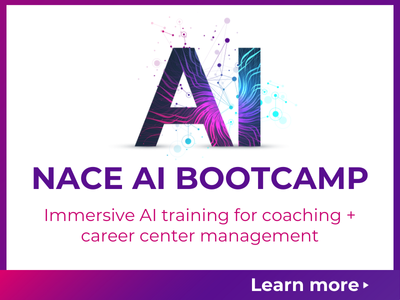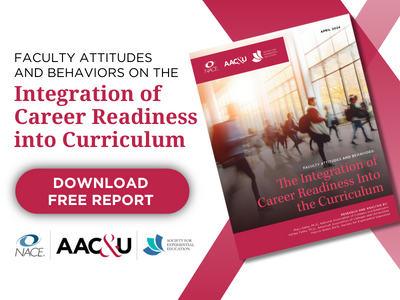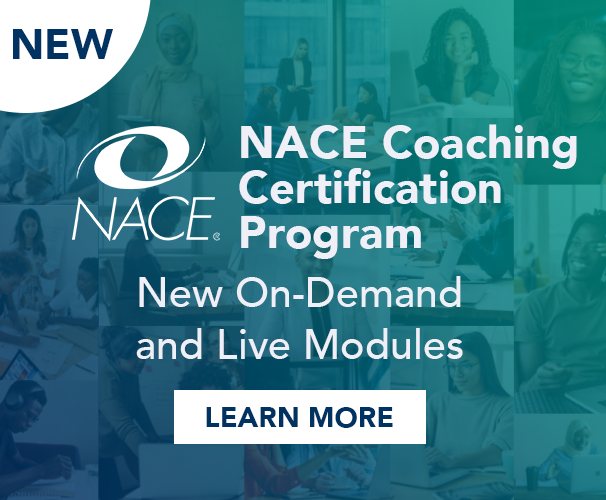NACE Journal, February 2018
In the February 2015 issue of the NACE Journal, the authors detailed their efforts to provide students with a more customized experience by implementing the industry-centric career cluster model in 2013. Now, five years later, they offer an update on how the model has changed the way they serve their students.
A major doesn't always equal a career.
Five years ago, staff within University Career Services (UCS) at Rutgers University – New Brunswick proclaimed that "a major doesn't always equal a career" and began transitioning away from a major-centric approach to our work in favor of the career cluster model. Four years ago, our advising staff completed the transition from generalists to specialists, and more of our programs, resources, and services were tailored to career clusters that any student, regardless of major, could explore. Three years ago, we authored "Developing the Industry-Centric Career Cluster Model," which appeared in the February 2015 edition of the NACE Journal, and shared how our central career services office began the journey to redefine student perceptions of their career pathways, balance competing priorities, and combat a deepening campus perception of departmental shortcomings. We chronicled our journey of retooling career advising, programs and workshops, employer development efforts, and curricular initiatives while creating staff buy-in for a career cluster approach. Two years ago, 21 students interested in opportunities within the food and agriculture, and environmental and natural resources industries eagerly sat in the USC seminar room, waiting for a bus to take them to the National Audubon Society. This trip was part of a series of new campus-to-careers field trips organized for each cluster through which students could explore the world of work. One student in that group raised her hand to proclaim that she never realized we had programs for students like her who were interested in these kinds of fields. Since the 2015 article explaining our efforts, our staff has made significant progress toward designing innovative cluster-specific resources. In this update article, we will briefly explain the career cluster concept, cover an organizational change, and highlight newly implemented cluster-specific student programs, curricular initiatives, alumni engagement efforts, and enhancements to employment services.
Evolution of Our Model and Office
A brief history of career clusters
Many professionals are now familiar with the career cluster concept. Some schools refer to them as “clusters” while they are known as “career communities” or even “career interest groups” at others. Whether you are in the beginning stages of understanding how this model can work at your institution or you have already successfully implemented a similar model, it is important to understand where the concept began, how it has evolved, and where its future lies.
At Rutgers, we implemented our model in the fall of 2013. While most of us like to consider ourselves at the "forefront" of our field, the career cluster concept actually dates from the late 1990s and was heavily promoted through what is now called the Advance Career Technical Education Consortium (AdvanceCTE). The idea behind it was to group occupations with similar skillsets into categories and provide curricular options to schools based on these standard types. While Rutgers does not use the full list of 16 categories highlighted by AdvanceCTE, they provided a starting point for developing our own groupings based on what we knew about our particular student population.
Changes to our career cluster model
Historically, Rutgers was similar to many schools in that we had a major-centric approach to providing career services. Our career advisers were "generalists" and served as liaisons to academic departments. However, a variety of factors made it clear that we needed to make a change, so we launched the cluster model to organize our staff and refine our service delivery into six main cluster areas. (Please review our February 2015 NACE Journal article for more information on how and why we implemented the model.)
Fast forward five years, and we have already restructured our career interest areas from six to seven clusters and made other necessary changes to ensure we remain relevant to students and provide impactful services. To put it bluntly, we've stayed nimble to respond quickly to the needs of our students, campus partners, and employers. Our current industry-based career clusters are:
- Arts, Communication, and Entertainment;
- Business, Financial Services, and Logistics;
- Education and Public & Human Services;
- Food & Agriculture and Environmental & Natural Resources;
- Life Sciences and Health; and
- Science, Technology, Engineering, and Math
Each cluster has associated sub-topics, which allow students to pick a more distinct area within the broader cluster category. For example, within the “Education and Public & Human Services” cluster, a student can select a sub-topic such as “Higher Education Administration.” We also continue to promote a seventh career cluster called "Students Still Deciding" for those students who need to further explore themselves and various career pathways before making a decision. (See the Career Cluster Took Kit. Within it, you’ll find a video that outlines our career clusters.)
Changes to our department organizational structure
In addition to renaming and adding a career cluster, we also reorganized the structure of our office (see the tool kit for organization charts). Four years ago, our department consisted of three units—career development and experiential education, employer relations, and operations and strategic initiatives—each with its own director who reported to our executive director. With the further deployment of our cluster model and an increased emphasis on students within the “Still Deciding” cluster, we decided to split our career development and experiential education unit into two distinct units. Each of these new units has separate directors who can focus more deliberately on the missions of their respective groups.
The new career development unit became very industry cluster-focused with each adviser assigned to a specific cluster. The unit primarily provides cluster-specific advising services to upperclassmen engaging in career preparation and organizes programs designed to help students network and successfully navigate the job and internship search process. They also engage campus partners—such as faculty, staff, and student organizations—that are closely aligned to their assigned cluster, and they also participate in site visits and recruiter strategy sessions.
Our new career education and engagement unit focuses primarily on first-year and sophomore students within the “Still Deciding” cluster to engage them in the career exploration process. The unit is comprised of three teams:
- First-year engagement team, which oversees interest-specific transition seminars for first-year students;
- Career education team, which facilitates core career exploration and experiential education programs; and
- Alumni-student engagement team, which develops programs that connect students with alumni for career exploration through mentorship.
With the separate units, we have further refined our services to address the needs of students who already know what cluster they are interested in versus those students who are beginning the process and need to further explore their career options.
New Cluster-Specific Services Since February 2015
New field trips
We know that direct exposure and hands-on experience are critical in helping students to make informed career decisions. To facilitate these connections, we began offering field trips to various employer sites geared toward each career cluster. While on the trip, students have the opportunity to interact with employees in their actual work environment and explore their options. We now offer six field trips per semester with each cluster having a focused excursion twice a year. Last year, nearly 300 students participated in our Campus-to-Careers field trips, with statistically significant increases in all associated learning objectives. According to evaluations, the top reasons students participated in these trips were to:
- learn about entry-level and internship opportunities;
- understand the qualifications needed to obtain a position at the organization;
- practice networking skills; and
- gain exposure to the workplace.
Through these experiences, students have the opportunity to experience first-hand the type of employment settings that align with their interest areas.
Career cluster meetups
In addition to field trips, this fall we implemented a series of small-group dialogues called "Cluster Meetups." These informal meetings take place in various areas across campus and are co-facilitated by one of our full-time cluster-specific career advisers and a student peer career adviser assigned to that cluster. The meetups begin with a brief presentation followed by open discussion. This fall, we offered three meetups for each cluster area. Attendance was a bit rocky to start—in fact, one meetup attracted just one student—but we learned from our experience and attendance improved with time. (Tip: Be careful about scheduling around big events. In our case, a meetup was scheduled near a large career fair, and the marketing for the career fair drowned out all other program marketing.) With an average of 10 students participating in each one-hour meetup, the advisers can interact with more students than they would in an individual appointment. More importantly, students learn from each other by sharing their experiences.
Curriculum initiatives and 5,000 students, annually
Curriculum integration is another critical component of spreading the career cluster concept at Rutgers.
While support levels from faculty can vary across departments, we have been very fortunate to incorporate the existing First-Year Interest Group Seminars (FIGS) into the university career services departmental structure. These one-credit, 10-week transitional courses are taught by talented upper-class peer instructors during the fall semester. They allow students to explore an interest area, while also exposing them to opportunities available at Rutgers and beyond. FIGS are organized into more than 30 topics covering a variety of career interests, with more than 75 sections offered in the fall. By incorporating the FIGS program and staff into our department, we have been able to expand our reach to nearly 1,800 first-year students and ensure they are engaged (early on!) in the career exploration process. Next year, marketing for the FIGS program will feature the topical areas organized under the overarching career interest cluster titles.
As part of the enhanced career development focus of FIGS, we have incorporated NACE's career readiness competencies into the evaluation and reflection process for the peer instructors who teach the seminars. They are being evaluated on the competencies before the course begins and after it has concluded to ascertain their skill development as peer instructors. In the future, we also plan to measure how the first-year students taking the FIGS courses develop in these career readiness competencies.
We have also been successful in reaching every transfer student through the Students in Transition Seminars at Rutgers. These seminars are mandatory for all 2,500 new transfer students. In partnership with our School of Arts & Sciences, we provide funding for an experienced instructor to teach a career module in each section. Through these courses, we introduce the clusters and help students to begin making SMART goals related to their interest areas.
Career clusters and alumni engagement
A year ago, our office created the alumni-student engagement team as part of our career education and engagement unit to formalize our partnerships with alumni wishing to assist students in their career development. Comprised of two existing staff members (one supported by alumni donations) and two new hires (one financially supported by our Rutgers University Alumni Association), the majority of the team focuses on assisting first-year and sophomore students to explore the world of work through engagement with alumni. Three cluster-related initiatives—Career Exploration Nights (CENs), the Student Alumni Career Connect System (SACC), and Road to Industry Programs (RTIPs)—have helped us to expand our reach with students earlier in their academic careers.
Career Cluster Tool Kit
Visit careers.rutgers.edu/ClusterToolkit to access a special tool kit containing information (e.g., sample position descriptions, marketing publications, previous cluster-related presentations, two strategic plans which include cluster-related initiatives, and more) you can use in your own work.CENs are informal cluster-specific events designed to expose students (primarily sophomores and first-year students) to various career pathways within that cluster. The two-hour evenings begin with a training session for students to introduce them to our other exploration services, and help them understand the purpose of the evening, calm any jitters, and ensure that they get the most out of the event. These students then transition into a larger space with 15 to 20 round tables, each staffed by one alumnus representing a particular occupation. Using a "speed networking" format—complete with automated visual countdowns and computerized voice instructions to facilitate table transitions—alumni answer student questions and share their journeys and experiences. The roundtable format allows students to ask questions from the comfort of a peer group.
During the fall 2017 semester, we held three of these events with anywhere between 10 and 20 alumni at each one. In total, 402 students participated in the three evenings with 56 percent being from our targeted population of first-year and sophomore students. Based on the pre- and post-evaluations, students reported statistically significant increases in all learning objectives, including:
- awareness of the various career paths/options in the career cluster;
- confidence in their ability to speak with alumni about different career options;
- understanding of how this program fits into the overall career development process;
- knowledge of how their skills or interests transfer to the world of work or graduate school; and
- familiarity with the career exploration resources provided by university career services.
We will have three additional CENs focusing on our remaining career clusters during the spring semester.
Students participating in the CENs are also encouraged to join other students and alumni in our newly retooled SACC online system. Through SACC, students can virtually connect with alumni willing to provide career advice. We launched the system this fall, and as of December 1, 2017, we have 1,633 alumni and 1,626 students registered in the system as well as 1,167 messages sent between the groups.
When participants register for SACC, alumni are asked to select a career cluster group within the system. This allows students to filter the alumni directory by cluster and participate in related discussion groups. Our lead peer career advisers—new undergraduate student positions assigned to each career cluster—have now begun to engage participants in the online cluster-specific groups through our platform. These student employees post information, including upcoming events; highlight new employment opportunities within the cluster; and pose questions to the groups. We are excited to see this platform take off and already have partnerships developed with various academic partners interested in using the platform.
Students interested in more intense in-person mentoring experiences with alumni can apply to participate in our RTIPs. These intensive programs connect students with alumni mentors working in competitive industries within each career cluster. With a focus on first-year students and sophomores, each is limited to approximately 50 students per program; RTIPs are designed to help students learn about various fields and land competitive summer internships. Our “Road to Wall Street” program—aimed at the “Business, Financial Services, and Logistics” cluster—is in its sixth year, and this past year we launched the “Road to Communication and Media” program for the “Arts, Communication, and Entertainment” cluster.
We continue to use data from our career cluster subscriptions to enhance our employment services.
All students are invited to participate in various information sessions, programs, and events to learn about the career pathways within each of the highlighted sectors. Those who remain interested have an opportunity to apply and interview to become part of the mentor matching program. Alumni mentors then work with students to help them become more competitive and ready to succeed. The “Road to Wall Street” program has seen tremendous success with more than 90 percent of participants landing competitive summer internships on Wall Street. Many have gone on to launch successful careers after graduation. While open to all majors, the “Road to Wall Street” program successfully launched a spring semester, credit-bearing course, through a partnership with the Rutgers Business School, to further educate participating students about the financial sector. We hope to see similar success with our new “Road to Communication and Media” program, which attracted more than 100 applications for the inaugural mentoring cohort. Our goal is to eventually have one RTIP for each career cluster. We are currently reviewing student career cluster registration data to identify and launch another program next semester.
Career clusters and employment services
We continue to use data from our career cluster subscriptions to enhance our employment services. As outlined in the November 2017 NACE Journal article, "Ph.D. Not Required: Using Data to Maximize Effectiveness," we conduct periodic position gap analyses to determine where we need to focus our employer development efforts, send cluster-specific job/internship blast e-mails to students to increase applications to posted positions, and allow students to filter employers participating in career fairs by career clusters. Since instituting these measures, we have seen a 58 percent increase in student applications to position postings and a 24 percent increase in graduates stating our recruiting services contributed to their post-graduation success (including a 31 percent increase among our School of Arts & Sciences graduates). We have also secured funding to hire a new job and internship developer for the “Arts, Communication, and Entertainment” cluster to decrease the gap in employment opportunities, and to highlight employment services to students who have historically not seen the value of these services.
Last year, the employer engagement team within our employer relations unit also organized six cluster-specific “Industry Connect” events. These events connected students to employers working in various occupations for networking. While we made the strategic decision to discontinue these programs in favor of our new CENs, we learned a lot of lessons that we have implemented in these events. The switch means we have been able to streamline the planning process and provide additional capacity for our employer relations unit to focus on other endeavors.
Moving Forward
In summer 2018, we plan to launch a new website that will provide us with the opportunity to highlight our career clusters to constituents more prominently. However, we have already made significant progress in updating our career cluster web resources. Our technology and data management team has developed a cluster interest inventory assessment, which recommends particular clusters to students based on their areas of interest. And, a section of our site organizes most of our resources and content tailored to the career clusters. We are excited to see where our new website will take us in the future.
We continue to seek out new ways to incorporate our career clusters into the work that we do. Meanwhile, the data suggest we are headed in the right direction. Since initiating our cluster model in 2013, our overall student engagement levels have increased by 25 percent, as more students recognize that we have services geared toward them. The percentage of graduating students identifying our recruiting resources as contributing to their post-graduation outcomes has risen by 24 percent now that we promote opportunities based on their actual interest areas. And, nearly 30,000 current students and recent alumni have identified a career cluster within our system; this helps us to identify opportunities for further employer development.
Although we are proud of the strong statistics, it is still the statement of the student waiting to take part in the National Audubon Society field trip that stands out to us: "I never realized you had programs for students like me who were interested in these types of fields." Such statements are the reason we do what we do—they are why we spend so much time painstakingly offering and promoting services to students tailored to their interest areas. Students don't know what they don't know. But it's our job to find ways to help them become aware. And that's something that makes us very proud at Rutgers University – New Brunswick. #RUTGERSWORKS!






